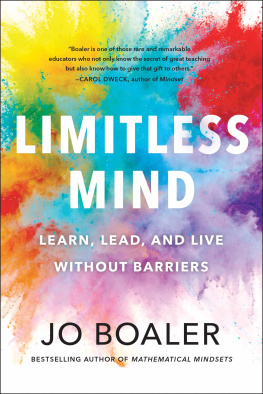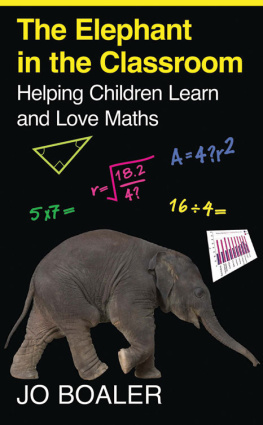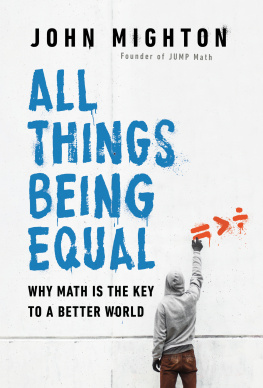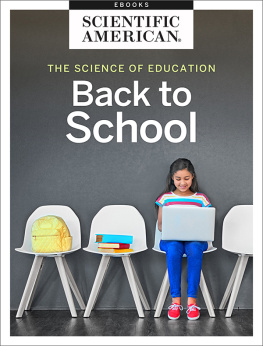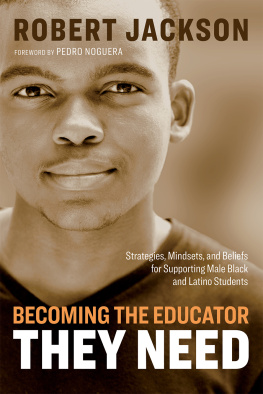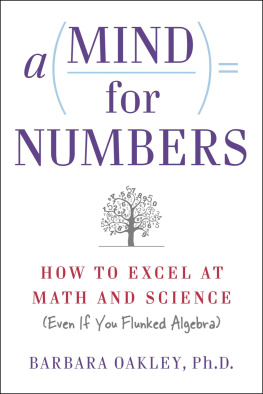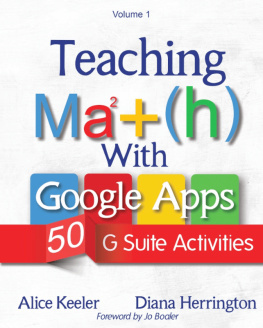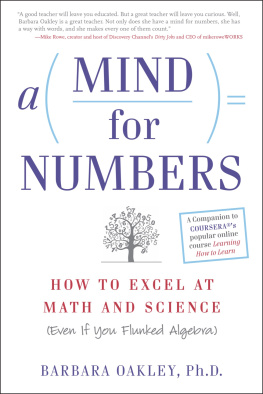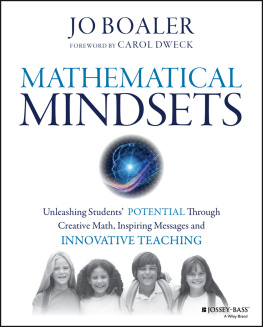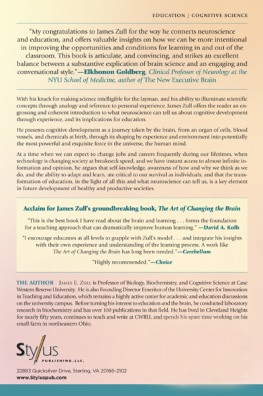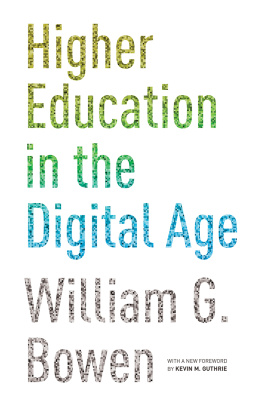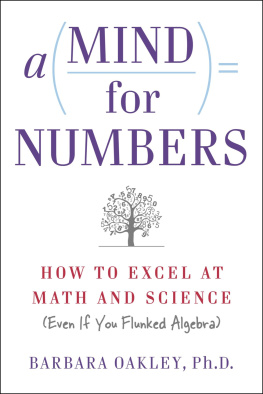I T WAS A SUNNY DAY and I stopped to appreciate the sunlight playing on the columns of the San Diego museum as I walked into my presentation. A flutter of nerves passed through me as I climbed the steps of the auditorium, ready to share the latest science on the ways we learn to a room packed with medical professionals. I speak regularly in front of teachers and parents but was uncertain how a different audience would relate to my latest discoveries. Would my ideas fall flat?
I neednt have worried. The response from the group of medical professionals was the same as that of the many students and educators I regularly work with. Most were surprised, some were shocked, and all could immediately see the crucial connections of these ideas to their work and lives. Several even started to see themselves in a new light. Saraan occupational therapistrushed up to me afterward to tell me how she dropped out of a math major many years ago when the work got difficult and she felt as if she didnt belong. She recalled an experience of being held back by damaging and incorrect beliefs about her ability. She believed, as most people do, that there were limits to what she could do.
But what if the opposite is true, and we can all learn anything? What if the possibilities to change our expertise, to develop in new directions, to form different identities as people are actually endless and continue throughout our lives? What if we wake up every day of our lives with a changed brain? This book will share evidence that our brainsand our livesare highly adaptable, and that when people fully embrace this knowledge and change their approach to their lives and their learning, incredible outcomes result.
Almost every day I meet people who believe damaging ideas about themselves and their learning, and they come from all ages, genders, jobs, and walks of life. Typically people will tell me that they used to like math, art, English, or another subject area, but when they started to struggle, they decided they did not have the right brain for the work and gave up. When people give up on math, they also give up on all math-related subjects, such as science, medicine, and technology. Similarly, when people get the idea they cannot be a writer, they give up on all subjects in the humanities, and when people decide they are not artistic, they give up on painting, sculpture, and other aspects of the fine arts.
Every year millions of children start school excited about all they will learn, but quickly become disillusioned when they get the idea they are not as smart as others. Adults decide not to follow pathways they had hoped to pursue because they decide they are not good enough for them, or they are not as smart as other people. Thousands of employees enter meetings in the workplace anxious that they will be found out, and exposed for not knowing enough. These limiting and damaging ideas come from inside us, but they are usually sparked by incorrect messages sent by other people, and by institutions of education. I have met so many children and adults whose lives were limited by incorrect ideas that I decided it was time to write a book dispelling the damaging myths holding people back on a daily basis; it was time to offer a different approach to life and to learning.
A large number of people are told directly that they are not a math person or an English person or an artist by teachers or parents. In an attempt to be helpful, adults tell young learners that a particular subject is just not for them. This happens to some when they are children. For others, it happens later in life when they are taking college courses or interviewing for their first job. Some people are given negative messages about their potential directly; others assume it from culturally embedded ideasthat some people can achieve and some cannot.
When we learn the new science in this book and the six keys of learning I will present, our brains function differently, and we change as people. The six keys not only change peoples beliefs about their reality, they change their reality. This is because as we begin to realize our potential, we unlock parts of ourselves that had been held back and start to live without limiting beliefs; we become able to meet the small and large challenges we are faced with in life and turn them into achievements. The implications of the new science are important for everyone. For teachers, leaders, and learners, the changed possibilities created by this new information are far reaching.
I am a Stanford professor of education who has spent the last few years collaborating with brain scientists, adding their knowledge of neuroscience to my knowledge of education and learning. I regularly share the new knowledge that is in this book, and invite people to think differently about problems, and it changes the way they think about themselves. I have spent the last several years focusing on mathematics, the subject with the most damaging ideas held by teachers, students, and parents. The idea that math ability (and a host of other capabilities) is fixed is a large part of the reason that math anxiety is widespread in the US and the world. Many children grow up thinking that either you can do math or you cant. When they struggle, they assume they cant. From that point on, any struggle is a further reminder of their perceived inadequacies. This affects millions of people. One study found that 48 percent of all young adults in a work-apprentice program had math anxiety; It is difficult to know how many people walk around in society harboring damaging ideas about their math ability, but I estimate it to be at least half of the population.
Researchers now know that when people with math anxiety encounter numbers, a fear center in the brain is activatedthe same fear center that lights up when people see snakes or spiders. As the fear center of the brain becomes activated, activity in the problem-solving centers of the brain is diminished. It is no wonder that so many people underachieve in mathematicsas soon as people become anxious about it, their brains are compromised. Anxiety in any subject area has a negative impact on the functioning of the brain. It is critical that we change the messages that are given to learners about their ability and rid education and homes of anxiety-inducing teaching practices.
We are not born with fixed abilities, and those who achieve at the highest levels do not do so because of their genetics. I will be sharing the most compelling evidence on this topic in the next chapter.
When I make the point with adultsoften teachers and educatorsthat we should reject ideas of fixed thinking and instead see all learners as capable, these adults invariably tell me about themselves as learners. Almost all of them can recall their own experience and realize the ways in which they themselves were limited and held back. We have all been fully immersed in the damaging myth that some are smartthey have a gift or special intelligenceand some are not, and these ideas have shaped our lives.
We now know that ideas about limits to potential or intelligence are incorrect. Unfortunately, they are persistent and widespread in many cultures across the world. The good news is that when we challenge these beliefs, incredible results follow. In this book, we will upend these ingrained and dangerous self-limiting beliefs and reveal the opportunities that open up when we adopt a limitless approach. The limitless approach starts with knowledge from neuroscience and expands into a different approach to ideas and to life.

